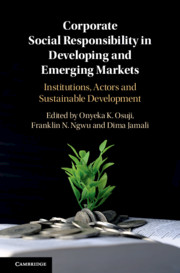 Corporate Social Responsibility in Developing and Emerging Markets
Corporate Social Responsibility in Developing and Emerging Markets from Part III - Normative and Utility Perspectives
Published online by Cambridge University Press: 18 December 2019
The chapter acknowledges a broad consensus following the recession of 2008 that ethically challenging practices have permeated the world of today’s businesses. Not only are the developing and emerging economies suffering from unethical corporate practices, they are also plagued by poor leadership. They also note that, in many cases, business leaders and entrepreneurs fail to understand their discretionary responsibilities to care for the ecosystem on which lives and businesses depend in enjoying the fruits of the free market and taking advantage of weak governance mechanisms and poor leadership, especially in the developing and emerging economies. The authors argue that the tenets of sustainability, which emphasizes the purpose of business as economic advancement coupled with concerns for socio-environmental well-being, offers some direction towards filling the ethical gap in management education to ensure sustainable development in the emerging economies. The chapter therefore examines how sustainability education can be more deliberately advanced in business and management education institutions in the emerging and developing countries.
To save this book to your Kindle, first ensure [email protected] is added to your Approved Personal Document E-mail List under your Personal Document Settings on the Manage Your Content and Devices page of your Amazon account. Then enter the ‘name’ part of your Kindle email address below. Find out more about saving to your Kindle.
Note you can select to save to either the @free.kindle.com or @kindle.com variations. ‘@free.kindle.com’ emails are free but can only be saved to your device when it is connected to wi-fi. ‘@kindle.com’ emails can be delivered even when you are not connected to wi-fi, but note that service fees apply.
Find out more about the Kindle Personal Document Service.
To save content items to your account, please confirm that you agree to abide by our usage policies. If this is the first time you use this feature, you will be asked to authorise Cambridge Core to connect with your account. Find out more about saving content to Dropbox.
To save content items to your account, please confirm that you agree to abide by our usage policies. If this is the first time you use this feature, you will be asked to authorise Cambridge Core to connect with your account. Find out more about saving content to Google Drive.